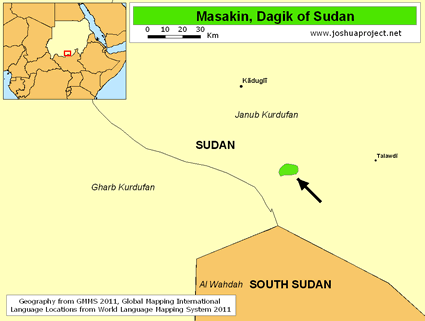Historically, the Dagik, also known as the Masakin, were semi-nomadic, combining pastoralism with subsistence farming to sustain their way of life. Eventually they settled into the Nuba Mountains of South Kordofan, Sudan where they have lived for many generations. They speak the Dagik language, which is part of the Niger-Congo language family.
The Dagik have faced various challenges over the years, including conflicts and pressures from neighboring groups, but they have managed to preserve their distinct language and cultural practices.
The Dagik people live in small, close-knit communities, often in remote and rugged terrain. They rely heavily on agriculture and livestock herding, with cattle, goats and sheep playing central roles in their economy. The Dagik's daily life revolves around the seasons, as they plant and harvest crops such as millet and sorghum.
Social structure within the Dagik community is strongly hierarchical, with elders holding significant authority and responsibility for decision-making. Despite the challenges of living in isolated areas, the Dagik maintain strong communal bonds and traditions that define their way of life.
The Dagik people practice a blend of traditional African beliefs and Islam. Islam, introduced through trade and interaction with neighboring groups, coexists with their traditional practices. The Dagik's spiritual life includes rituals and ceremonies connected to the land, ancestors and natural elements. These beliefs guide their understanding of the world and influence many aspects of daily life, including agriculture, social organization and conflict resolution.
The Dagik face significant challenges, particularly in accessing education and healthcare. Schools are few and far between, leading to low literacy rates and limited opportunities for the younger generation. Healthcare is similarly scarce, with most Dagik people relying on traditional medicine or traveling long distances to access basic medical services. Additionally, the Dagik struggle with water scarcity, particularly during the dry season, which affects both their agricultural activities and daily living conditions. Economic development opportunities are limited, trapping many families in a cycle of poverty.
Pray that God sends many loving medical workers to the Dagik people.
Pray that God would work in the hearts of the Dagik to give them a hunger to hear God's word, a solid understanding of Jesus Christ, and the determination to believe the message regardless of the cost.
Pray for the handful of believers, that God would meet their needs and keep them strong in the face of any form of persecution.
Scripture Prayers for the Masakin in Sudan.
| Profile Source: Joshua Project |











